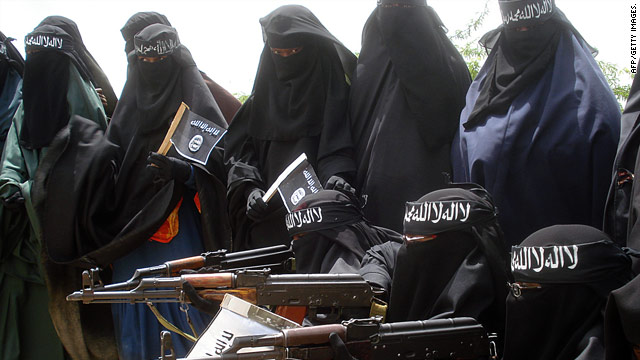CNN
July 15, 2010 -- Updated 1609 GMT (0009 HKT)
Women pose with weapons at an Al-Shabaab demonstration against the Somali government in Mogadishu.
STORY HIGHLIGHTS
- Al-Shabaab promises to "unleash new tide of terror"
- The statement comes days after the deadly Kampala attacks
- Militants object to Uganda's involvement with the peacekeeping force in Somalia
(CNN) -- Al-Shabaab, the Somali militant group allied to al Qaeda which claimed responsibility for Sunday's deadly bombings in Uganda, has promised to "unleash a new tide of terror."
"This is only the beginning," the group said in a statement on the internet Thursday.
Al-Shabaab, meaning "the youth" in Arabic, claimed responsibility for the bombings at two locations in the Ugandan capital of Kampala that killed 76 people.
The attackers struck an Ethiopian restaurant in a neighborhood dotted with bars and popular among expatriates. Two other bombs exploded at a rugby center.
Police in Uganda have reported arrests in connection with the bombings, which also wounded dozens of people.
Al-Shabaab had said it is waging war "against 6,000 collaborators," a reference to the African Union peacekeeping force that includes Ugandan troops and warned Ugandans to refrain from involvement in Somalia.


RELATED TOPICS
The Islamic militant group has been fighting Somalia's U.N.-backed transitional government and has previously threatened attacks on Uganda.
It is believed to number up to 7,000 armed men, with a main force of around 3,000 fighters with well-honed guerrilla skills, according to Agence France-Presse.
But the weekend bomb attacks in Kampala marked the first time the group has claimed responsibility for an operation beyond the Somali border, apart from sporadic attacks across the border into northern Kenya.
It advocates a strict, often brutal, Saudi Arabian-inspired Wahhabi interpretation of Islam. It emerged in 2005 as the militant youth wing of the Islamic Courts Union (ICU), which briefly controlled much of the Horn of Africa nation before being ousted in 2006 by troops from neighboring Ethiopia.
While most of the ICU's leaders fled, Al-Shabaab fighters under leader Ahmed Abdi Godane remained behind to wage a guerilla-style war against the invading force, winning control of much of central and southern Somalia. Somalia has had no effective administration since Mohamed Siad Barre's regime collapsed in 1991.
Links to Osama bin Laden's al Qaeda terror network also gave Al-Shabaab valuable manpower and resources. The group is also alleged to have benefited from piracy off the coast of Somalia.
In March last year bin Laden issued a statement calling for Muslims everywhere to "help the Somali mujahedeen fight until Somalia is an Islamic state."
According to the transitional administration in Mogadishu the burgeoning relationship with al Qaeda led to an influx of militant fighters from abroad.
Senior U.S. administration officials who briefed reporters on Tuesday about the attack said the group has threatened the United States and committed violent acts in Somalia since it was formed. It has conducted assassinations of peace activists, aid workers, prominent officials, and journalists.
As well as ties with al Qaeda, officials said people from Al-Shabaab have contacts with other al Qaeda-linked groups in East Africa and the Arabian Peninsular.
"Its agenda is very similar to al Qaeda's agenda," an official said.
Senior African Union military figures say the signs of al Qaeda's hand in the fighting are visible through the use of Improvised Explosive Devices, or IEDs, and suicide bombings.
The group has also become particularly adept at using the media in this way to announce details of attacks that it has carried out.
Somali President Sheikh Sharif Sheikh Ahmed, once a moderate figure in the ICU, told CNN in April that Al-Shabaab had reached out to the Somali diaspora living in the West, radicalizing young Muslims via the Internet and encouraging them to move back to the country to join the "Jihad."
In Nairobi, the Kenyan government said on Thursday that a Ugandan national who had been working with Al-Shabaab gave himself up to police in recent days.
It's unclear whether he had any ties to the bombing but said he didn't want to work with the militants anymore. Authorities handed him over to Ugandan authorities on Tuesday, a government spokesman said.
Kenya said it also bolstered its troop presence along the Somali-Kenyan border in the aftermath of the Kampala attack. Kenya borders Uganda and Somalia.
U.S. officials said that U.S. law enforcement agencies are well aware of Al-Shabaab. But they said there had been no "advance warning" of the attacks in Kampala.
CNN's Paul Armstrong contributed to this report.


No comments:
Post a Comment